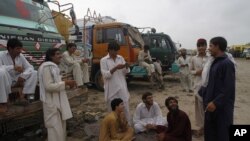ISLAMABAD — Just one day after Pakistan decided to reopen NATO supply routes into Afghanistan, drivers who have been waiting for months are ready to get their supply convoys moving. But as the reopening comes with drivers' calls for increased security.
Most of the truck drivers have been sitting idle since late last year when Pakistan blocked the NATO supply lines to protest a cross-border coalition raid that mistakenly killed 24 Pakistani troops.
Pakistani leaders had linked the reopening of the border crossings to a formal U.S. apology for the deadly assault. The incident plunged bilateral ties to an all-time low.
For nearly eight months, the Obama administration offered regrets and condolences but no unconditional apology for the attack.
On Tuesday, Secretary of State Hillary Clinton ended the stalemate by saying "sorry" for the loss of life. However, she reiterated that mistakes on both sides led to the airstrikes on Pakistan military posts. Islamabad swiftly responded to her statement by agreeing to reopen the supply lines.
Pakistan's Cabinet endorsed the decision Wednesday. Federal Information Minister Qamar Zaman Kaira later defended the restoration of the supply routes.
The minister says Pakistan took the decision in order to help both the security transition in Afghanistan and return of international forces from the country. As he put it, Pakistan ultimately wants a sovereign government in Afghanistan and that it would be in the interest of the neighbors.
Truck drivers are praising the reopening of the supply lines, saying they will finally be able to feed their families after months of unemployment.
But their excitement is tempered by the Pakistani Taliban's threat to attack the convoys, saying the supplies are being used against fellow fighters battling international forces in Afghanistan.
Nawab Sher Afridi is a representative of All Pakistan Oil Tanker Owners Association. He tells VOA that truckers are readying their vehicles to ferry supplies from the southern port city of Karachi to the border towns - Torkham and Chaman - in the country's north and southwest. But he says they need extra protection.
He says security will be the most important need for the drivers and that he hopes the Pakistani government will coordinate with his association to ensure truckers’ protection.
Taliban insurgents have attacked and torched these convoys in the past, killing dozens of people.
Under the deal that led to reopening of the supply lines, the United States will release held-up payments of more than $1 billion to reimburse Pakistan's military for the cost of counter-insurgency operations.
Most of the truck drivers have been sitting idle since late last year when Pakistan blocked the NATO supply lines to protest a cross-border coalition raid that mistakenly killed 24 Pakistani troops.
Pakistani leaders had linked the reopening of the border crossings to a formal U.S. apology for the deadly assault. The incident plunged bilateral ties to an all-time low.
For nearly eight months, the Obama administration offered regrets and condolences but no unconditional apology for the attack.
On Tuesday, Secretary of State Hillary Clinton ended the stalemate by saying "sorry" for the loss of life. However, she reiterated that mistakes on both sides led to the airstrikes on Pakistan military posts. Islamabad swiftly responded to her statement by agreeing to reopen the supply lines.
Pakistan's Cabinet endorsed the decision Wednesday. Federal Information Minister Qamar Zaman Kaira later defended the restoration of the supply routes.
The minister says Pakistan took the decision in order to help both the security transition in Afghanistan and return of international forces from the country. As he put it, Pakistan ultimately wants a sovereign government in Afghanistan and that it would be in the interest of the neighbors.
Truck drivers are praising the reopening of the supply lines, saying they will finally be able to feed their families after months of unemployment.
But their excitement is tempered by the Pakistani Taliban's threat to attack the convoys, saying the supplies are being used against fellow fighters battling international forces in Afghanistan.
Nawab Sher Afridi is a representative of All Pakistan Oil Tanker Owners Association. He tells VOA that truckers are readying their vehicles to ferry supplies from the southern port city of Karachi to the border towns - Torkham and Chaman - in the country's north and southwest. But he says they need extra protection.
He says security will be the most important need for the drivers and that he hopes the Pakistani government will coordinate with his association to ensure truckers’ protection.
Taliban insurgents have attacked and torched these convoys in the past, killing dozens of people.
Under the deal that led to reopening of the supply lines, the United States will release held-up payments of more than $1 billion to reimburse Pakistan's military for the cost of counter-insurgency operations.
